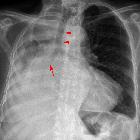Golden S sign
The Golden S-sign is seen on both PA chest radiographs and on CT scans. It is named because this sign resembles a reverse S shape, and is therefore sometimes referred to as the reverse S-sign of Golden.
Although typically seen with right upper lobe collapse, the S-sign can also be seen with the collapse of other lobes. It is created by a central mass obstructing the upper lobe bronchus and should raise suspicion of a primary bronchogenic carcinoma. It can also be caused by other central masses, such as: metastasis, primary mediastinal tumor, or enlarged lymph nodes.
Radiographic features
Plain radiograph
The Golden S-sign is seen on frontal chest radiographs. In the most common situation, the appearance is that of right upper lobar collapse (the right upper lobe appearing dense and shifting medially and upwards) with a central mass expanding the hilum. These two changes together form a reverse S-shape.
History and etymology
The sign was first described by R Golden in 1925 .
Siehe auch:
und weiter:

 Assoziationen und Differentialdiagnosen zu Golden S sign:
Assoziationen und Differentialdiagnosen zu Golden S sign:


